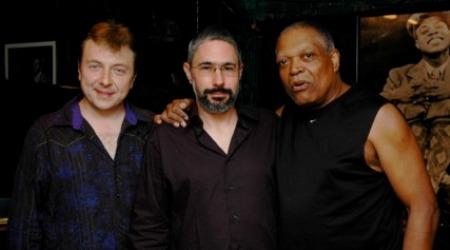Jean-Michel Pilc Trio featuring Boris Kozlov and Billy Hart
Jean Michel Pilc – piano, Boris Kozlov – double bass, Billy Hart – drums
Born in 1960 in Paris and now an American citizen, self-taught, Jean-Michel Pilc has played with Roy Haynes, Michael Brecker, Marcus Miller, Kenny Garrett, Lenny White, Chris Potter, John Abercrombie, Mingus Dynasty & Big Band, Richard Bona and many others. Jean-Michel moved to New York City in 1995. In the last decade, Jean-Michel has been intensively touring worldwide, performing trio, solo, and also teaching clinics and masterclasses. In 2006, Jean-Michel has been appointed jazz teacher at NYU (New York University), where he is giving private lessons, ensemble classes and improvisation workshops.
His current international trio features some of the best jazz musicians available. His bassist, Boris Kozlov, was born in Moscow. He picked up acoustic bass while in College and later served in the Soviet Army playing horns and bass. In the nineties Boris studied at the State Academy of Music while touring USSR, Europe and USA with various jazz groups including his own. After winning the first spot in the Young Musician category in USSR Jazz Journal in 1991, Boris moved to New York. While there he has performed, recorded and toured with Michael Brecker, Bob Berg, Benny Golson, Ravi Coltrane, Alex Sipiagin, David Kikoski, Michel Petrucciani, among others. Since 1998 Boris has been playing Charles Mingus' bass as well being an arranger and Musical Director for the Mingus Big Band.
Billy Hart is one of the most influential, melodic and creative drummers in jazz. His first steady gigs of note were with Shirley Horn. In the 1960’s he toured with Jimmy Smith, Wes Montgomery, Eddie Harris, and Pharoah Sanders. In 1970 he joined Herbie Hancock’s Sextet, and after that band broke up in 1973 he joined first McCoy Tyner (two years) and then Stan Getz (four). He also played with Miles Davis. Billy is featured on about 600 hundred records as a sideman. As a leader, he has formed ensembles that have been discreet pioneers of musical styles, featuring musicians such as Bill Frisell, Eddie Henderson, Branford Marsalis, Steve Coleman, Kenny Kirkland, Kevin Eubanks, Chris Potter, Dave Kikoski and many others.
George Duke Band
George Duke – piano, keyboard, Shannon Pearsons – vocals, Jeff Lee Johnson - guitar, , Mike Manson – bass guitar, Ronald Bruner – drums
Veteran keyboardist and producer George Duke remembers a time when funk was a powerful force – not just in popular music but in social discourse. Frequently with a measure of wit and irony, and often with a strong dose of positivity at the core, titans like James Brown, Sly and the Family Stone and other funk icons of the ‘60s and ‘70s boldly addressed societal concerns ranging from poverty to racial disharmony to the battle of the sexes.
George Duke was born in San Rafael, California, and reared in Marin City, a working class section of Marin County. When he was just four years old, his mother took him to see Duke Ellington in concert. "I don't remember it too well," says George, "but my mother told me I went crazy. I ran around saying 'Get me a piano, get me a piano!'" He began his piano studies at age seven, absorbing the roots of Black music in his local Baptist church. "That's where I first began to play funky. I really learned a lot about music from the church. I saw how music could trigger emotions in a cause-and-effect relationship."
Digging deep and coming up with great music is what George Duke has always been about, and his current project is no exception. It’s a fun and entertaining ride, to be sure, but underneath the occasional tongue-in-cheek posturing and comedic moments – the stuff that made R&B and funk so engaging in the first place – is music of substance that speaks to both the lighter and darker sides of the world we live in.
“I feel a responsibility to carry positive messages in my music,” says Duke. “I think music is meant to lift people up. I don’t think you can push things under the rug and not address them. Those who have the ability and the opportunity to let people know what’s going on musically and socially should not be afraid to say it and do it and play about it and sing about it.”







